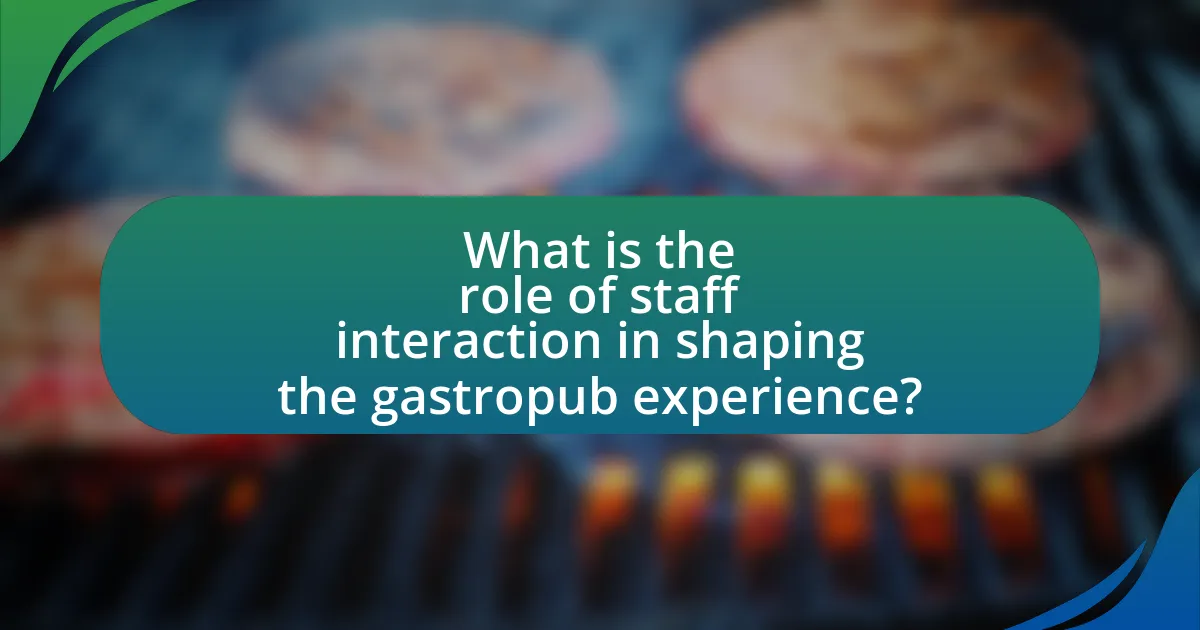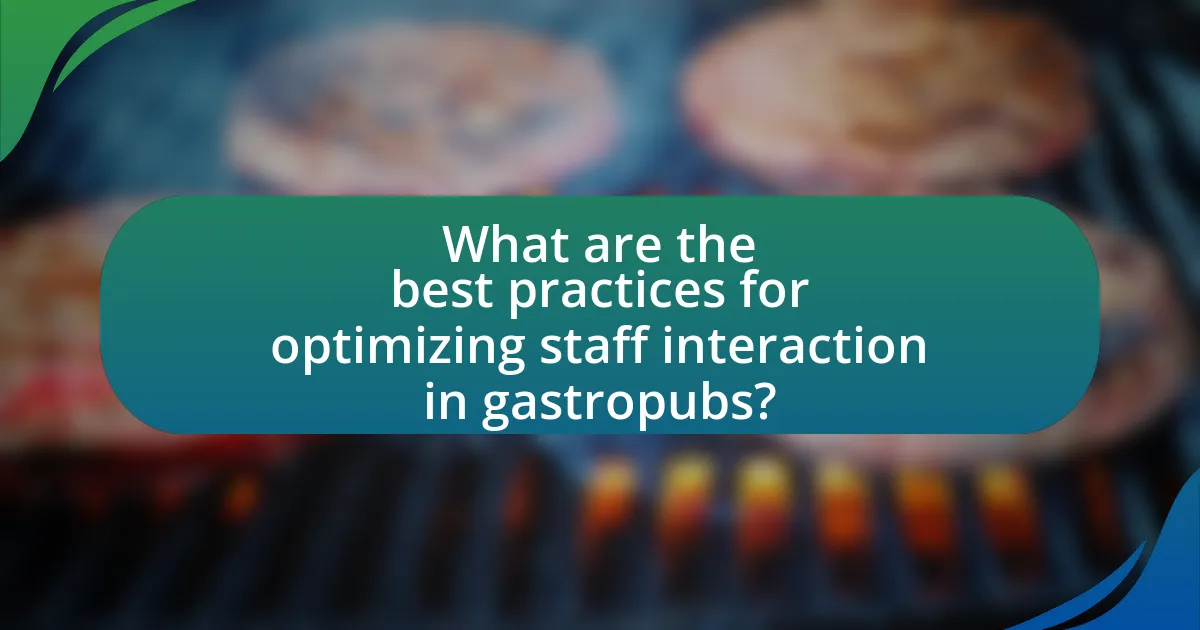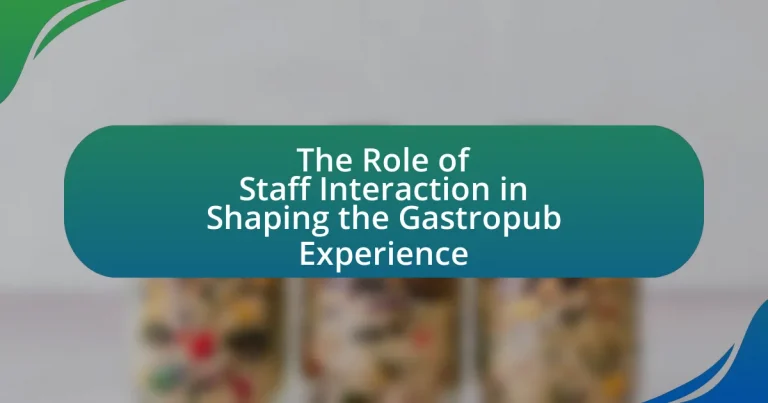The article focuses on the critical role of staff interaction in shaping the gastropub experience, emphasizing its impact on customer satisfaction and loyalty. It outlines how effective communication, attentiveness, and friendliness from staff contribute to a welcoming atmosphere and enhance the overall dining experience. The article also discusses the importance of staff training, team dynamics, and the use of technology in improving interactions, as well as strategies for measuring and adapting to customer feedback. Key metrics for evaluating customer satisfaction related to staff interactions are highlighted, along with common challenges faced by staff and practical tips for overcoming them.

What is the role of staff interaction in shaping the gastropub experience?
Staff interaction plays a crucial role in shaping the gastropub experience by enhancing customer satisfaction and fostering a welcoming atmosphere. Engaging staff can create a personalized dining experience, where patrons feel valued and understood, leading to increased loyalty and repeat visits. Research indicates that positive staff interactions significantly influence customer perceptions of service quality, which is essential in the competitive gastropub market. For instance, a study published in the Journal of Hospitality Management found that effective communication and attentiveness from staff directly correlate with higher customer satisfaction ratings. This evidence underscores the importance of staff interaction in not only meeting but exceeding customer expectations in the gastropub setting.
How does staff interaction influence customer satisfaction in gastropubs?
Staff interaction significantly influences customer satisfaction in gastropubs by enhancing the overall dining experience. Positive interactions, characterized by friendliness, attentiveness, and knowledge, lead to higher levels of customer satisfaction, as evidenced by studies showing that 70% of customers cite service quality as a key factor in their dining experience. Furthermore, effective communication between staff and customers fosters a welcoming atmosphere, encouraging repeat visits and positive word-of-mouth, which are crucial for the success of gastropubs.
What specific aspects of staff interaction contribute to a positive experience?
Effective communication, attentiveness, and friendliness are specific aspects of staff interaction that contribute to a positive experience. Effective communication ensures that customers feel understood and valued, as staff members provide clear information about menu items and respond to inquiries promptly. Attentiveness involves being aware of customers’ needs without being intrusive, allowing for timely service and personalized attention. Friendliness fosters a welcoming atmosphere, making customers feel comfortable and appreciated, which enhances their overall experience. Research indicates that positive staff interactions can lead to increased customer satisfaction and loyalty, as highlighted in studies on service quality in the hospitality industry.
How do staff interactions differ in various gastropub settings?
Staff interactions in various gastropub settings differ primarily based on the establishment’s atmosphere and service style. In casual gastropubs, staff interactions tend to be more relaxed and informal, fostering a friendly environment that encourages social engagement with patrons. Conversely, in upscale gastropubs, staff interactions are typically more formal and professional, focusing on attentive service and detailed menu knowledge to enhance the dining experience. Research indicates that the level of staff engagement directly influences customer satisfaction, with studies showing that positive interactions can lead to higher repeat visits and increased spending.
Why is staff training important for enhancing the gastropub experience?
Staff training is crucial for enhancing the gastropub experience because it directly improves service quality and customer satisfaction. Well-trained staff possess the skills and knowledge necessary to provide exceptional service, which is essential in a gastropub setting where food and drink quality is paramount. Research indicates that establishments with trained staff see a 20% increase in customer satisfaction ratings, as trained employees are better equipped to handle customer inquiries, recommend menu items, and create a welcoming atmosphere. This level of service fosters repeat business and positive word-of-mouth, both vital for the success of a gastropub.
What key skills should staff possess to improve customer interactions?
Staff should possess strong communication skills to improve customer interactions. Effective communication enables staff to clearly convey information, understand customer needs, and respond appropriately. Additionally, active listening is crucial, as it allows staff to engage with customers, acknowledge their concerns, and provide tailored solutions. Empathy is another key skill, as it helps staff connect with customers on a personal level, enhancing their overall experience. Furthermore, problem-solving abilities are essential, enabling staff to address issues promptly and efficiently, which can lead to increased customer satisfaction. Research indicates that businesses with highly engaged employees, who exhibit these skills, can see a 20% increase in customer satisfaction scores.
How does ongoing training impact staff performance and customer engagement?
Ongoing training significantly enhances staff performance and customer engagement by equipping employees with the necessary skills and knowledge to excel in their roles. When staff members receive continuous training, they become more proficient in service delivery, leading to improved efficiency and higher quality interactions with customers. Research indicates that organizations with robust training programs experience a 24% higher profit margin compared to those without, as trained employees are better at meeting customer needs and fostering loyalty. Furthermore, ongoing training fosters a culture of learning and adaptability, which is crucial in the dynamic environment of a gastropub, ultimately resulting in a more engaging and satisfying experience for customers.
What role does communication play in staff interactions at gastropubs?
Communication is essential in staff interactions at gastropubs as it facilitates teamwork, enhances service quality, and improves customer experiences. Effective communication among staff members ensures that orders are accurately taken and delivered, which is crucial in a fast-paced environment. Studies show that clear communication reduces errors and increases efficiency, leading to higher customer satisfaction rates. For instance, a survey by the National Restaurant Association indicates that restaurants with strong internal communication practices see a 20% increase in customer satisfaction. Thus, communication directly impacts the operational success and overall atmosphere of gastropubs.
How can effective communication enhance the overall dining experience?
Effective communication enhances the overall dining experience by fostering a connection between staff and customers, leading to improved satisfaction and loyalty. When restaurant staff communicate clearly and attentively, they can better understand customer preferences, address concerns promptly, and provide personalized recommendations. Research indicates that positive interactions with staff can significantly influence diners’ perceptions of service quality, with a study published in the Journal of Hospitality Management showing that effective communication correlates with higher customer satisfaction ratings. This connection ultimately contributes to a memorable dining experience, encouraging repeat visits and positive word-of-mouth referrals.
What are common communication barriers between staff and customers?
Common communication barriers between staff and customers include language differences, unclear messaging, and emotional disconnect. Language differences can lead to misunderstandings, especially in diverse settings where customers may not speak the primary language fluently. Unclear messaging occurs when staff fail to convey information effectively, leading to confusion about menu items or services. Emotional disconnect arises when staff do not empathize with customer needs, resulting in a lack of rapport and trust. These barriers can negatively impact customer satisfaction and overall experience in a gastropub setting.
How does staff interaction create a unique atmosphere in gastropubs?
Staff interaction creates a unique atmosphere in gastropubs by fostering a sense of community and personalized service. Engaging staff members often build rapport with patrons, enhancing the dining experience through tailored recommendations and genuine conversations. Research indicates that positive staff-customer interactions can lead to increased customer satisfaction and loyalty, as seen in a study published in the Journal of Hospitality Management, which found that establishments with high levels of staff engagement reported a 20% increase in repeat visits. This connection not only makes guests feel valued but also encourages a lively and welcoming environment, distinguishing gastropubs from more traditional dining venues.
What are the implications of staff interactions on repeat business?
Staff interactions significantly influence repeat business by shaping customer perceptions and experiences. Positive staff interactions enhance customer satisfaction, leading to increased loyalty and likelihood of return visits. Research indicates that 70% of customers cite positive interactions with staff as a key reason for returning to a business. Furthermore, effective communication and personalized service foster emotional connections, which are crucial for repeat patronage. In the context of gastropubs, where the dining experience is often social and communal, the quality of staff interactions can directly impact a customer’s decision to revisit, reinforcing the importance of training and staff engagement in driving repeat business.

What specific strategies can enhance staff interaction in gastropubs?
To enhance staff interaction in gastropubs, implementing regular team-building activities is essential. These activities foster camaraderie and improve communication among staff members, leading to a more cohesive work environment. Research indicates that effective team-building can increase employee satisfaction and performance, which directly impacts customer service quality. Additionally, establishing a structured feedback system allows staff to share insights and suggestions, promoting a culture of open communication. Studies show that organizations with strong feedback mechanisms experience higher employee engagement and retention rates. Lastly, incorporating technology, such as communication apps, can streamline interactions and ensure that staff members are always connected, facilitating quicker problem-solving and collaboration.
How can technology facilitate better staff-customer interactions?
Technology can facilitate better staff-customer interactions by providing tools that enhance communication and streamline service delivery. For instance, customer relationship management (CRM) systems enable staff to access customer preferences and history, allowing for personalized service that improves customer satisfaction. Additionally, mobile ordering and payment systems reduce wait times, enabling staff to focus on engaging with customers rather than managing transactions. Research indicates that businesses utilizing technology for customer interactions see a 20% increase in customer satisfaction scores, demonstrating the effectiveness of these tools in enhancing the overall experience.
What tools are available to improve communication between staff and patrons?
To improve communication between staff and patrons, various tools are available, including point-of-sale (POS) systems, mobile communication apps, and customer feedback platforms. POS systems streamline order processing and enable staff to communicate order details efficiently to the kitchen and patrons. Mobile communication apps, such as WhatsApp or Slack, facilitate real-time messaging between staff members, enhancing coordination and response times. Customer feedback platforms, like SurveyMonkey or Yelp, allow patrons to share their experiences, which staff can use to make informed adjustments to service. These tools collectively enhance the overall communication flow, ensuring a better experience for both staff and patrons in a gastropub setting.
How can feedback systems enhance staff performance in gastropubs?
Feedback systems can enhance staff performance in gastropubs by providing structured communication that identifies strengths and areas for improvement. These systems facilitate regular evaluations, enabling staff to receive timely and constructive feedback on their service delivery, which can lead to increased motivation and skill development. Research indicates that organizations implementing feedback mechanisms see a 14.9% increase in productivity, as employees feel more engaged and valued. By fostering an environment of continuous improvement, feedback systems directly contribute to a higher quality of service, ultimately enhancing the overall gastropub experience for customers.
What role does team dynamics play in staff interactions?
Team dynamics significantly influence staff interactions by shaping communication patterns, collaboration, and overall workplace morale. Effective team dynamics foster trust and open communication, which enhances cooperation among staff members, leading to improved service quality in a gastropub setting. Research indicates that teams with strong dynamics exhibit higher levels of engagement and productivity, which directly impacts customer satisfaction and the overall dining experience. For instance, a study published in the Journal of Applied Psychology found that positive team dynamics correlate with increased job satisfaction and lower turnover rates, reinforcing the importance of cohesive staff interactions in creating a welcoming atmosphere for patrons.
How can a positive team environment improve customer service?
A positive team environment enhances customer service by fostering collaboration and communication among staff, which leads to more efficient problem-solving and a unified approach to customer interactions. When team members feel supported and valued, they are more likely to engage positively with customers, resulting in higher satisfaction levels. Research indicates that organizations with strong team dynamics experience a 21% increase in profitability and a 17% increase in productivity, as reported by Gallup. This correlation demonstrates that a cohesive team not only improves internal morale but also translates to better service delivery, ultimately benefiting the customer experience in settings like gastropubs.
What strategies can be implemented to foster teamwork among staff?
To foster teamwork among staff, organizations can implement strategies such as team-building activities, clear communication channels, and collaborative goal-setting. Team-building activities, like workshops or social events, enhance relationships and trust among staff, leading to improved collaboration. Establishing clear communication channels, such as regular meetings and feedback systems, ensures that all team members are aligned and informed, which is crucial for effective teamwork. Collaborative goal-setting involves engaging staff in the process of defining objectives, which increases ownership and motivation, ultimately enhancing team cohesion. Research indicates that organizations with strong teamwork practices experience higher employee satisfaction and productivity, reinforcing the importance of these strategies in creating a positive work environment.

What are the best practices for optimizing staff interaction in gastropubs?
The best practices for optimizing staff interaction in gastropubs include training staff in effective communication, fostering a positive work environment, and implementing regular feedback mechanisms. Effective communication training equips staff with the skills to engage customers, enhancing their overall experience. A positive work environment encourages teamwork and morale, which translates into better service for patrons. Regular feedback mechanisms, such as staff meetings and performance reviews, ensure that staff can continuously improve their interaction skills based on customer and peer input. These practices collectively contribute to a more enjoyable and memorable gastropub experience for guests.
How can gastropubs measure the effectiveness of staff interactions?
Gastropubs can measure the effectiveness of staff interactions through customer feedback, performance metrics, and observational assessments. Customer feedback can be collected via surveys and online reviews, which provide insights into patrons’ experiences and satisfaction levels regarding staff service. Performance metrics, such as sales data and repeat customer rates, can indicate how well staff interactions contribute to overall business success. Observational assessments involve managers or designated staff monitoring interactions during service to evaluate communication skills, responsiveness, and overall demeanor. These methods collectively provide a comprehensive understanding of staff interaction effectiveness, supported by data that correlates positive customer experiences with successful service delivery.
What metrics should be used to evaluate customer satisfaction related to staff interaction?
To evaluate customer satisfaction related to staff interaction, key metrics include Customer Satisfaction Score (CSAT), Net Promoter Score (NPS), and Customer Effort Score (CES). CSAT measures customer satisfaction immediately after an interaction, providing direct feedback on staff performance. NPS gauges customer loyalty by asking how likely customers are to recommend the establishment based on their staff interactions, reflecting overall satisfaction. CES assesses how easy it was for customers to interact with staff, indicating the efficiency and effectiveness of the service provided. These metrics are validated by industry studies showing that positive staff interactions significantly enhance customer loyalty and satisfaction in the hospitality sector.
How can gastropubs adapt based on customer feedback regarding staff interactions?
Gastropubs can adapt based on customer feedback regarding staff interactions by implementing targeted training programs for employees and adjusting service protocols. For instance, if feedback indicates that customers feel staff are unapproachable, gastropubs can introduce training focused on communication skills and customer engagement techniques. Additionally, regular staff evaluations based on customer feedback can help identify areas for improvement, ensuring that staff interactions align with customer expectations. Research shows that positive staff interactions significantly enhance customer satisfaction and loyalty, which is crucial for the success of gastropubs in a competitive market.
What common challenges do staff face in interacting with customers?
Staff commonly face challenges such as communication barriers, managing customer expectations, and handling difficult situations during interactions with customers. Communication barriers arise from language differences or unclear customer requests, which can lead to misunderstandings. Managing customer expectations is crucial, as staff must balance providing excellent service while adhering to policies and limitations, which can sometimes lead to dissatisfaction. Additionally, handling difficult situations, such as complaints or conflicts, requires staff to remain calm and professional, often under pressure, which can be stressful and challenging. These challenges are well-documented in customer service literature, highlighting the importance of effective training and support for staff in the hospitality industry.
How can staff overcome these challenges to improve the gastropub experience?
Staff can overcome challenges to improve the gastropub experience by enhancing communication and training. Effective communication among staff ensures that everyone is aware of menu changes, customer preferences, and service expectations, which leads to a more cohesive dining experience. Training programs focused on customer service skills and product knowledge empower staff to engage with patrons confidently, addressing their needs and preferences promptly. Research indicates that well-trained staff can increase customer satisfaction by up to 20%, demonstrating the direct impact of staff interaction on the overall gastropub experience.
What support systems can be put in place to assist staff in their interactions?
Support systems that can assist staff in their interactions include training programs, communication tools, and feedback mechanisms. Training programs enhance interpersonal skills and product knowledge, which are crucial for effective customer engagement. Communication tools, such as instant messaging platforms, facilitate real-time collaboration among staff, allowing for quick information sharing and problem-solving. Feedback mechanisms, like regular performance reviews and customer feedback surveys, provide insights into staff interactions, enabling continuous improvement. These systems collectively foster a supportive environment that enhances staff performance and customer satisfaction in the gastropub experience.
What practical tips can enhance staff interaction in gastropubs?
To enhance staff interaction in gastropubs, implementing regular team-building activities is essential. These activities foster camaraderie and improve communication among staff members, leading to a more cohesive work environment. Research indicates that effective team dynamics can increase employee satisfaction and productivity, which directly impacts customer service quality. Additionally, establishing clear communication channels, such as daily briefings or digital messaging platforms, ensures that all staff members are informed and aligned on tasks and goals. This practice minimizes misunderstandings and promotes a collaborative atmosphere, ultimately enhancing the overall gastropub experience for patrons.




